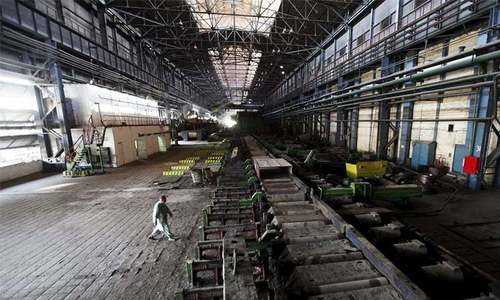ISLAMABAD: The government on Wednesday approved retrenchment of all the 9,350 remaining employees of the Pakistan Steel Mills (PSM) with a one-time severance cost of about Rs20bn.
A decision to this effect was taken at a meeting of the Economic Coordination Committee (ECC) of the cabinet presided over by Adviser to the Prime Minister on Finance and Revenue Dr Abdul Hafeez Shaikh.
“The meeting gave a go-ahead to a ‘full and final’ human resource rationalisation plan for the PSM employees in accordance with the judgements and observations of the Supreme Court of Pakistan and other courts hearing the cases involving the PSM,” said an official announcement.
The decision was taken on the revised summary of the Ministry of Industries and Production on the basis of an updated “human resource rationalisation plan” in line with the instructions issued by Dr Shaikh on May 13. The previous plan envisaged laying off 8,000 employees with a cost of Rs18.74bn.
Decision taken on industries ministry’s summary in line with instruction of PM’s aide
Under the decision, the government would retrench 100 per cent workforce that currently stood at 9,350. Out of total, only 250 employees would be retained for a period of 120 days for the execution of the plan and other necessary work. All other employees would be issued termination notices after the endorsement of the ECC decision by the federal cabinet in its forthcoming meeting. The financial impact of the plan works out at Rs19.657bn to be released in a single tranche to pay gratuity and provident funds.
In addition to this, one month salary would be paid to PSM employees from the approved supplementary grant on account of salaries of PSM employees. Thus, the average payment per employee comes to Rs2.3 million.
The Ministry of Industries and Production reported in its summary to the ECC that due to poor financial condition of the Steel Mills, the government has been paying net monthly salaries to employees since 2013. The PSM stopped its commercial operations in June 2015 without formulating any human resource plan of its 14,753 employees which has since come down to 9,350 in 2019.
Presently, the monthly net salary bill of PSM employees roughly stands at about Rs350 million, adjusted as loan in the financial accounts of the PSM. Since 2013, an aggregate loan of Rs34bn has been extended to the PSM by the federal government on account of net salary payment.
The PSM’s total expense on its employees for the financial year 2018-19 was recorded at Rs9.54bn that was 75.7pc of total production and operating expense, while local manufacturers engaged in iron and steel business spend approximately 3pc on their human resource. The average age of PSM employees was now 47 years, well above the average age of the employees working in the private steel sector at 36 years, the summary claimed, adding that 48pc of PSM employees were in the age bracket of 51 to 60 years.
Through a privatisation process, the government wanted to revive the PSM, the ministry said, adding that an oversized and aged human resource was one of the main obstacles. Technical Advisory Consortium was carrying out due diligence on different aspects including human resource of PSM before suggesting suitable mode of transaction.
Earlier on May 13, the ECC had agreed in principle for retrenchment of maximum staff in the light of Supreme Court verdicts and observations under the civil petition (326-K & 513-K of 2018) and had asked the Ministry of Industries to resubmit a proposal after reformulating the scope to all employees.
Mother industry
The failure of the country’s “mother industry is an unending story of unchecked corruption, inefficiency, and over-employment”, according to an earlier summary submitted to the ECC. The PSM has been closed since June 2015 when its gas supply was drastically curtailed for non-payment of bills which were significantly lower than the default of a private sector entity at the same time.
The Pak-China Investment Bank had declared in 2015 that with an initial investment of $289m (about Rs29bn), provision of uninterrupted electricity supply and a new management, the PSM had the potential of becoming a profitable enterprise given its ideal location, market and facilities.
Not only this, the country’s largest industrial complex could generate the funds required for expanding its production capacity to three million tonnes, the bank said and proposed a development and expansion plan with a capital investment of $288.77m in the first phase, $300.4m in the second and $296.62m in the third phase. The total investment required was $885.8m, or approximately Rs100bn.
On the basis of field surveys, extensive data and in-depth discussions, the financial advisers had concluded that the PSM was a steel enterprise which had a high starting point, complete process chain and the advantages of resource acquisition and regional market.
The advisers were of the opinion that because it was located near a coastal city with over 20m population and close to the 50,000-tonne bulk cargo wharf relying on raw material and fuels import, the PSM owned rare logistic cost advantages. With the expansion of its production capacity in future, its harbour could also be used to ship products to the rest of the market.
Published in Dawn, June 4th, 2020















































